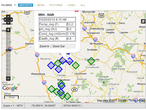
America's Ruling Class — And the Perils of Revolution
By Angelo M. Codevilla from the July 2010 – August 2010 issue of American Spectator
EXTRACT 1: They [the bi-opoly two parties] think, look, and act as a class.
EXTRACT 2: The two classes have less in common culturally, dislike each other more, and embody ways of life more different from one another than did the 19th century's Northerners and Southerners — nearly all of whom, as Lincoln reminded them, “prayed to the same God.” By contrast, while most Americans pray to the God “who created and doth sustain us,” our ruling class prays to itself as “saviors of the planet” and improvers of humanity. Our classes' clash is over “whose country” America is, over what way of life will prevail, over who is to defer to whom about what. The gravity of such divisions points us, as it did Lincoln, to Mark's Gospel: “if a house be divided against itself, that house cannot stand.”




